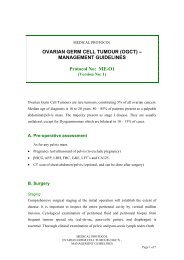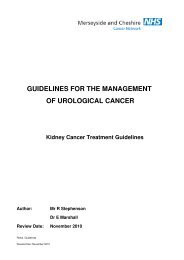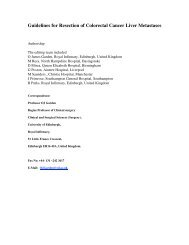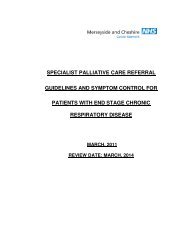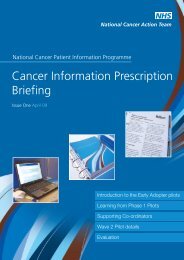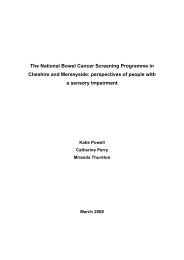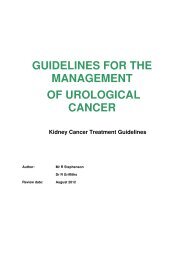Cancer Reform Strategy - NHS Cancer Screening Programmes
Cancer Reform Strategy - NHS Cancer Screening Programmes
Cancer Reform Strategy - NHS Cancer Screening Programmes
- No tags were found...
You also want an ePaper? Increase the reach of your titles
YUMPU automatically turns print PDFs into web optimized ePapers that Google loves.
CHAPTER 5: LIVING WITH AND BEYOND CANCER 77Box 30: Support for cancer patientsMaggie’s CentresMaggie’s Centres are for anybody affected by cancer – not just people who have beendiagnosed with cancer, but also their families, friends and carers.Maggie’s Centres help people achieve a psychologically healthy adjustment to their diagnosisand treatment. Maggie’s programme of support comprises, one-to-one support with a clinicalpsychologist, facilitated group sessions, benefits advice, nutrition workshops, relaxation sessionsand stress management courses and other activities including access to Maggie’s informationlibrary. Maggie’s programme is designed to give people the tools they need to cope with theupheaval cancer causes in their lives. Maggie’s programme and drop in facility supplements theservices available in hospitals, enabling them to provide a level of support that is beyond what isavailable in the health system. Maggie’s Centres enable people to share experiences with othersand with professional help, people are encouraged to address all aspects of living with cancer.Maggie’s Centres are free, not time limited and easily accessibly. Maggie’s Centres are built inclose proximity to major cancer centres and cancer units.There are five Maggie’s Centres in Scotland, with a sixth centre planned. The London Maggie’sCentre will open in early 2008 and further five centres are planned in Cotswolds, Nottingham,North East, South West Wales and Oxford. Throughout 2007, 58,000 visits were made toMaggie’s Centres.“Walking into Maggie’s was the best thing we ever did. It’s a real oasis. You come out ofMaggie’s and get on with living” Norrie Brown.The domestic scale and imaginative environment of the centres are a key part of the Maggie’sprogramme. Maggie’s Centres are places for people to be themselves, not a hospital patient.(www.maggiescentres.org)5.39 It is important to recognise that there are anumber of voluntary organisations and charitieswho provide high quality, innovative supportservices for cancer patients and survivors.An example of one is in Box 29.5.40 Patients with terminal cancer haveparticular supportive and palliative care needs asthey reach the last year of their life. Providingopportunities to discuss the implications ofentering the dying phase can improve thequality of life for both the patient and theircarer. Such opportunities need to be handledwith honesty and openness checking what theperson understands, how much they wish toknow and the extent to which other familymembers should be involved in their care.Exploring with the person their needs andpreferences is paramount and will preventunnecessary, inappropriate or prolongedtreatment.5.41 Having established this relationship andassessed their needs and preferences, this needsto be reviewed at regular intervals, which willtrigger the provision of other supportive andpalliative care such as carer information or outof hours support information.The role of the Clinical NurseSpecialist5.42 During the development of this strategypatients repeatedly told us of the vital role thatthe clinical nurse specialist (CNS) can play inimproving the experience of people living withand surviving cancer. Nurse specialists play ahugely valuable role across many differentelements of cancer patient management andsupport, carrying out a range of technical,informational, emotional and coordinationfunctions, including:●Familial risk assessment;



